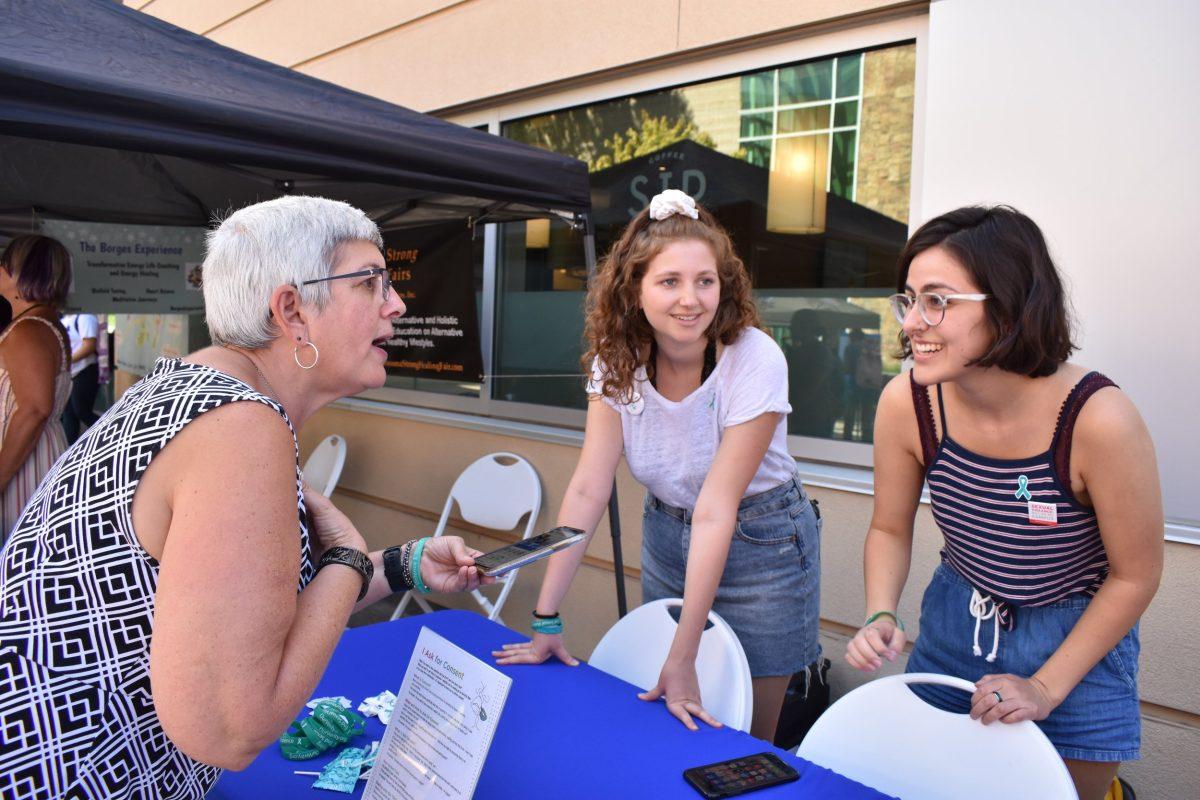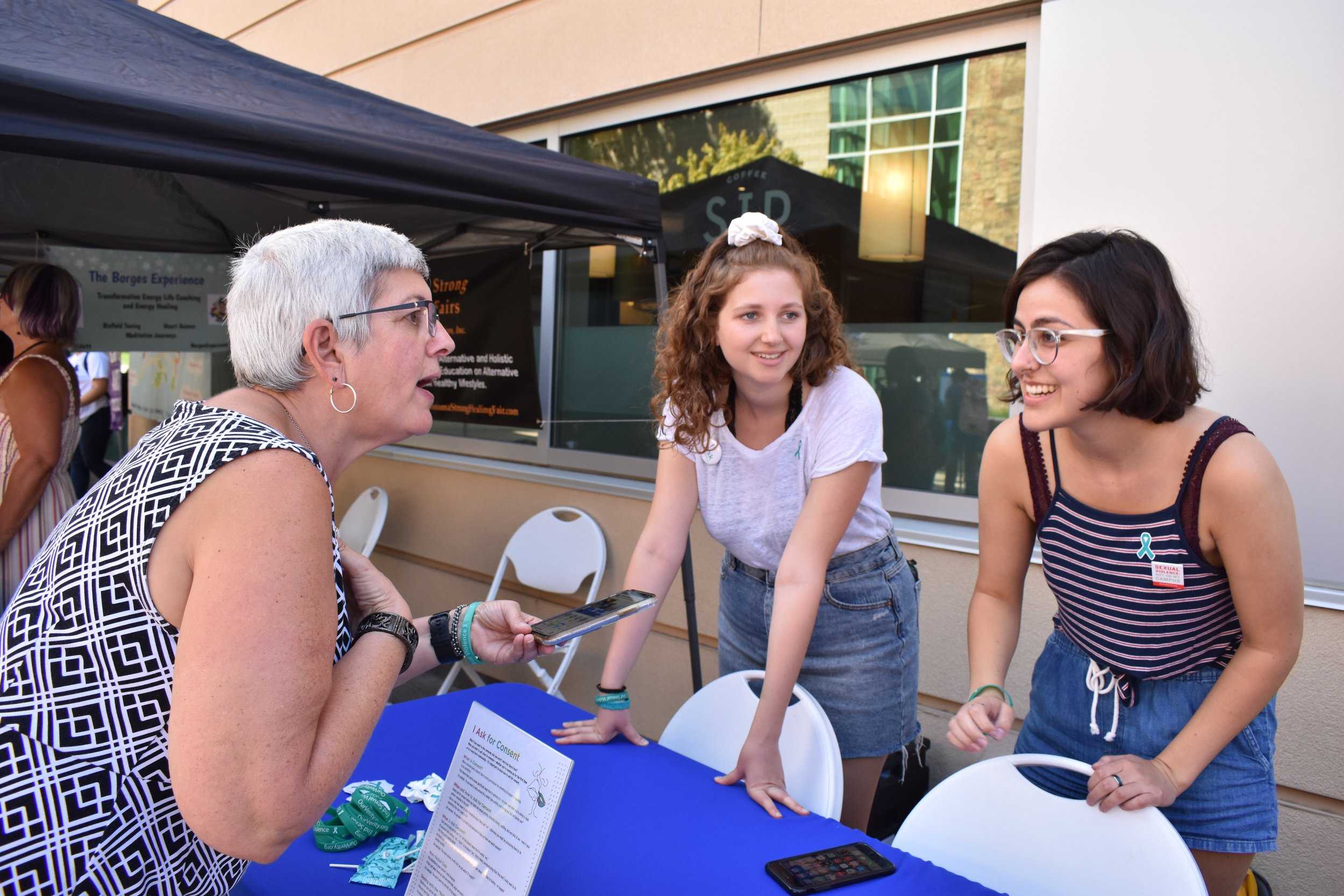Seawolf Plaza is many things. But, this time around, the Plaza becomes a one-stop spot for students to find a diversity of resources for many of their respective mental and physical needs–and so much more.
From 11:30 a.m. to 1 p.m., last Tuesday, Sept. 24, Sonoma State hosted another Student Health and Well-being Fair that helps to connect students with services that can benefit them; services ranging from food assistance programs, counseling and medical support, community engaging programs and various harassment relief programs that are free to all students.
Outside of its immediate-access college services, the fair also brings in other local businesses that are able to provide support to students. Businesses showcase their booths that sell self-defense weapons, sign-ups for local yoga and holistic services, financial guidance and services for students that seek rehabilitation support programs for anyone that might be interested.
Director of Student Affairs, Mo Phillips, says, “the idea is just different aspects of wellness and well-being. So, from physical; to mental; to financial; to spiritual; to intellectual, there are lots of different ways that we can look at wellness and well-being.”
Whether it is the Spiritual Fair or the Job Fair, Phillips is one of the leaders involved in orchestrating the last five fairs on campus. She does note, however, that the campus Recreation Center was a huge help in getting both outside organizations and students to come to the event.
Two of the invited local businesses, The Center for Vital Living and Songbird Community Healing Center, specialize in helping people relax. Both located in the heart of old downtown Cotati, just a few blocks from campus, they were both providing special offers to students on Tuesday, Sept. 24–as they aim to in the times ahead. The Center for Vital Living hosts a free raffle to win either a yoga class invitation or yoga products. This, all while Songbird Community Healing Center offers free ear-seed implants that are used to relax the ear muscles and reduces tendinitis. Both of the businesses use a variety of different anaerobic and holistic treatments to help their patients let go of their stresses and anxieties from daily life.
Yvette Racines, owner of The Center for Vital Living, described how, although it has a variety of yoga and yoga therapy classes, the company also withholds a range of holistic herbal and body massage treatments to help with fatigued minds or bodies. A popular treatment of theirs is called “Tui Na” and is a form of traditional chinese therapy. Through guided repositioning of the body by the practitioner, applying force to pressure points, it helps release unwanted tension in the joints and back of the body.
“When you’re finished, your joints feel more open, your spine feels longer and you feel lighter on your feet; but at the same time, much more grounded,” says Racines.
Songbird Community Healing Center also has a variety of holistic treatments like acupuncture and massages as well as different types of hypnotherapy, psychotherapy and life coaching services. It specializes in not only lowering stress and anxiety, but with things like insomnia, grief, addiction, depression, PTSD and more. With a variety of community classes and private classes, it works to help both the spirit and body.
For students in need of assistance with serious mental distress but are tight on money, the Sonoma State Counseling and Psychological services were also down at the event. Funded from registration fees paid by students, it offers free counseling to –any– student.
“We support the mental health of the whole campus community and we see a wide range of things, from simple aspects like homesickness and roommate issues to more complete things like bipolar illness of psychotic systems,” says Dr. Laura Williams.
Also there were the groups Sonoma Cares and the Officer of Prevention of Harrassment and discrimination, helping victims of sexual and physical assault, harassment and emotional abuse connect with services that can help them.
Sonoma Cares is also run by Susan Polito, a confidential advocate that helps a variety of victims of assault. She also works with the CAPS group and has group therapy meetings for victims of sexual assault with the guidance of a licensed therapist.
The Campus Organization Officer of Prevention of Harassment and Discrimination helps victims find aid programs, but she also actively works to try to help students before they become victims.
Booth internship leader, Britney Hopkins, says, “people think of us as the resolution people, which we absolutely do as people experience harassment, discrimination, retaliation, but were also about the prevention as well. So apart of what we’re doing out here today is helping people identify warning signs for abusive relationships versus healthy relationships,” she continues, we hope to try to prevent things from happening but we’re actually trying to change the culture here on campus so that people can find their way out of these kinds of situations.”
With the increase of assaults in the area recently, the booth offers both self defense tools and self defense classes. As the name entails, Damsel in Defense teaches potential victims how to defend themselves from an attacker: selling tools like tasers, pepper spray, tactical pens and warrior training classes that teach you how to use those tools.
For those just looking to get through the day with food to eat, there were also a number of booths centered around food assistance. With food insecurity becoming a growing problem all over, programs like Cal Fresh, Lobos Pantry, and SSU Culinary all came out to show their support.
Students were able to visit Cal Fresh and start an application process to seek aid through receiving free groceries at local grocery stores and farmers markets. This same program helps students to get the kinds of foods and vegetables needed to function so that they can work at their very best. Slightly relieved from the pressures of working too many hours just to pay bills and having enough left over for food, students are able to use that extra time to not get behind on school.
There are many different kinds of problems that students face everyday. Whether it be physical pain, mental pain, hunger, or something else, there are countless programs available for students that need it. Just because the fair is gone does not mean that these resources are not. Many of these resources are always available or can be directed to by the student resource center. Sonoma State has constantly been trying to find ways to improve life on campus for students, both for the individual and community of students as a whole. So, if you are at all feeling like you missed out, then reach out: odds are that the school can likely put you in the direction of finding the proper help that you need.




































